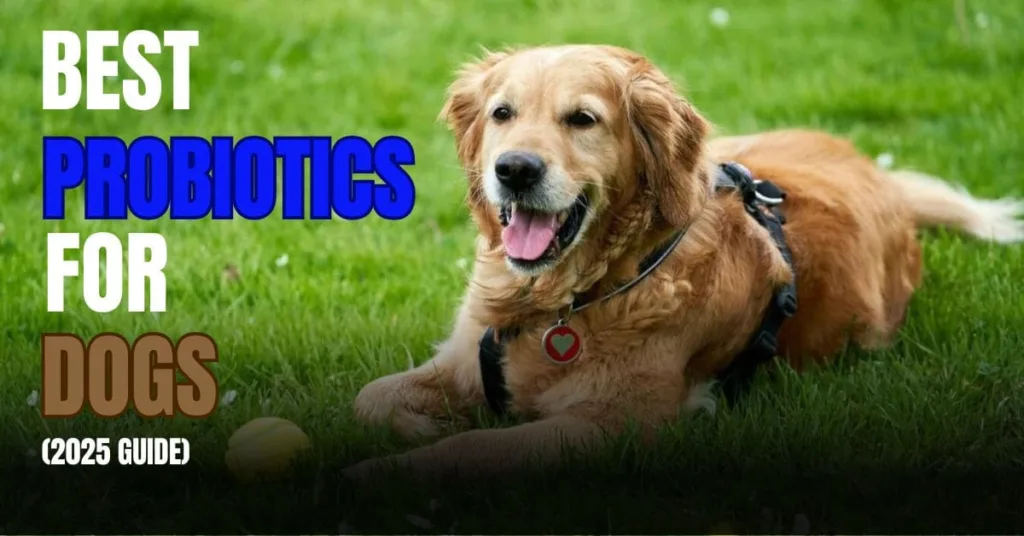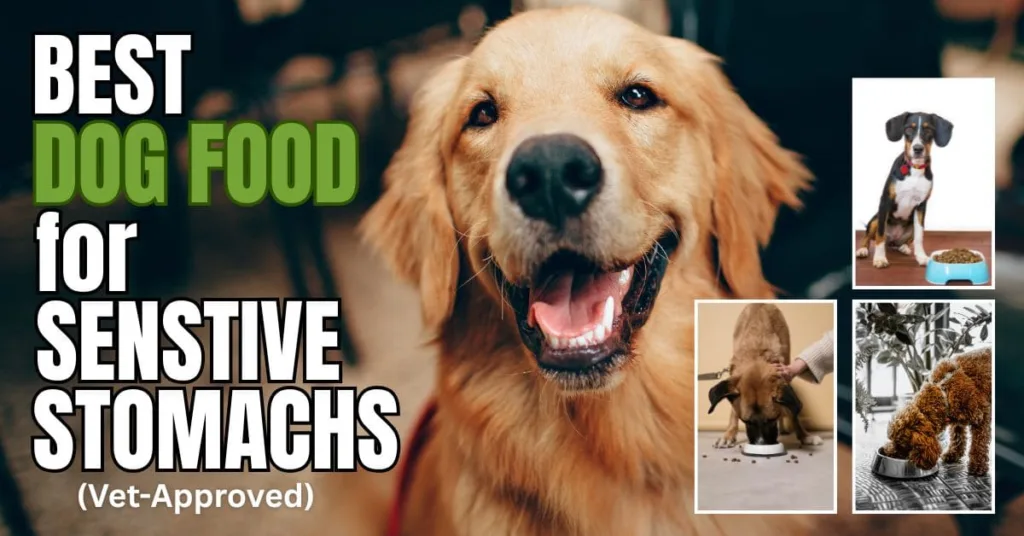Dogs with sensitive stomachs often struggle with diarrhea, bloating, or lack of appetite. As a pet parent, it’s heartbreaking to see your pup uncomfortable. One proven way to support digestion is by adding probiotics to their diet.
In this guide, we’ll explore what probiotics are, how they help, and the best probiotics for dogs with sensitive stomachs available for your furry friend.
While probiotics are commonly used to support digestion, not every dog responds the same way when they’re first introduced. Some dogs may experience temporary stool changes during the adjustment phase. If you’re concerned about this reaction, understanding Can Probiotics cause Diarrhea in Dogs can help set realistic expectations before starting supplementation.

What Are Probiotics and Why Do Dogs Need Them?
Probiotics are live microorganisms—commonly referred to as “good bacteria”—that colonize the gut and play an essential role in digestion, immunity, and nutrient absorption.
According to the American Kennel Club, probiotics can help maintain a healthy balance of gut bacteria and support overall digestive wellness in dogs.
A balanced gut microbiome helps dogs process food efficiently, absorb vitamins and minerals, and prevent harmful bacteria from taking over.
When the gut balance is disrupted—by antibiotics, stress, poor diet, or illness—dogs often develop digestive sensitivities.
Key benefits of probiotics include:
- Improved stool quality and regular bowel movements.
- Reduced bloating, gas, and indigestion.
- Enhanced immune defense against infections.
- Healthier skin, coat, and energy levels
When the gut balance is disturbed—due to antibiotics, poor diet, or stress—dogs develop stomach problems. Probiotics restore this balance naturally.
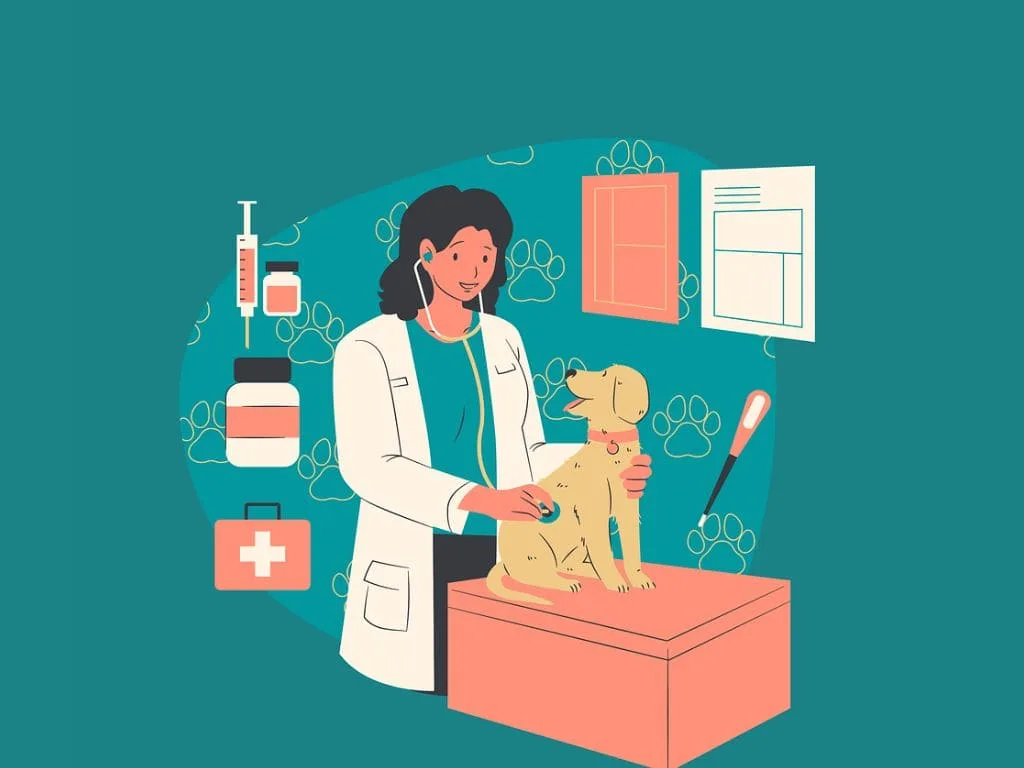
Signs Your Dog May Benefit from Probiotics
Not every dog requires probiotics daily, but there are clear warning signs that your pet may benefit from them.
Common Digestive Issues
- Frequent diarrhea
- Excessive gas and bloating
- Constipation
- Soft stools
Other Health Concerns
- Allergies and skin problems
- Low energy or fatigue
- Weak immunity
- Repeated stomach infections
If you notice these symptoms, your vet may recommend probiotics as part of the treatment. Probiotics help when food intolerance in dogs is causing chronic digestive upset.
Best Probiotics for Dogs with Sensitive Stomachs
Finding the right probiotic can be overwhelming. Based on vet recommendations and customer reviews, here are best probiotics for dogs with sensitive stomachs those are top picks for 2025:
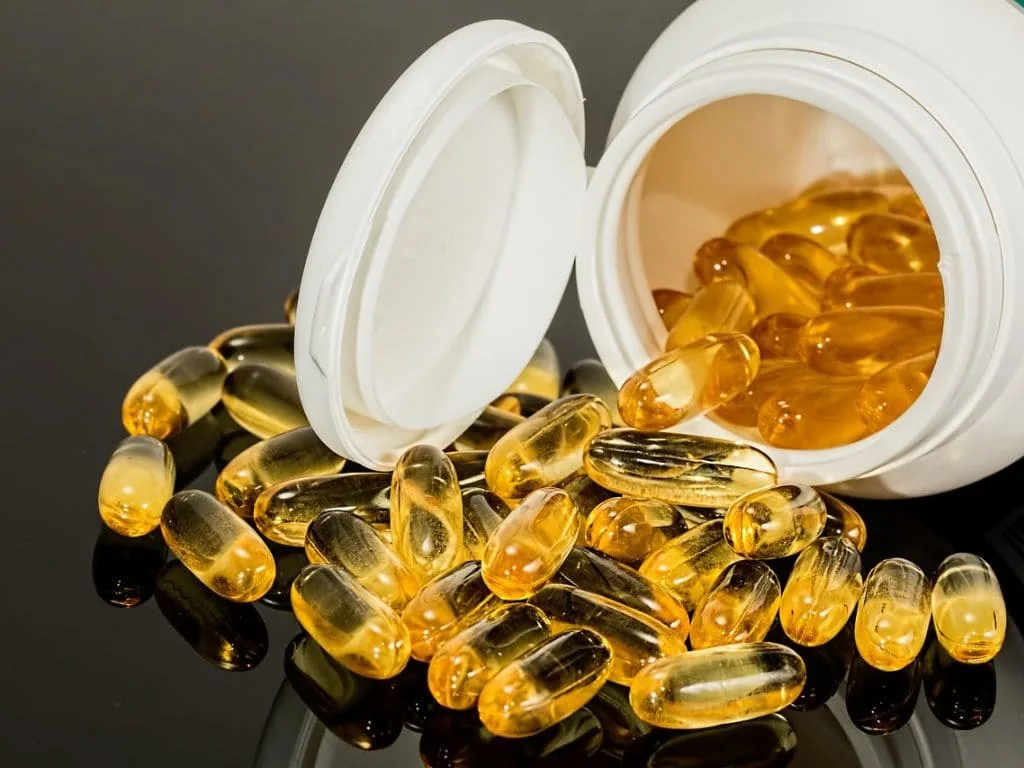
1. Purina FortiFlora Canine Nutritional Supplement
- Specially designed for dogs with diarrhea
- Improves stool quality in just a few days
- Easy to mix with food
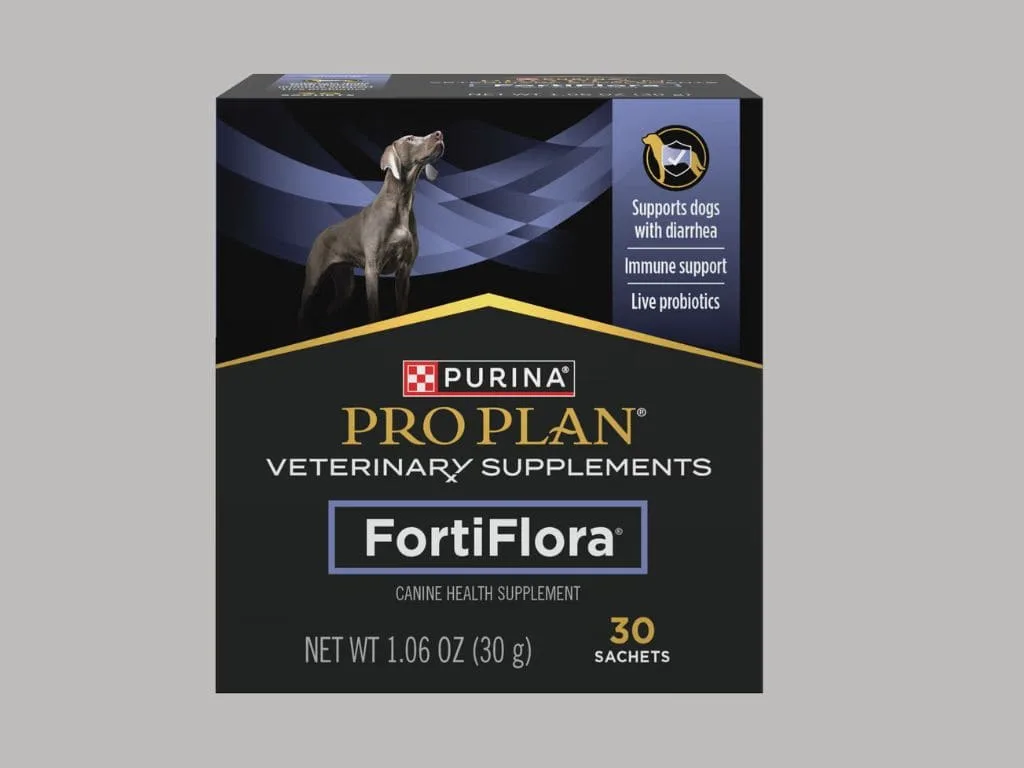
2. Nusentia Probiotic Miracle
- Grain-free powder
- Contains 6 beneficial strains
- Great for dogs with food sensitivities
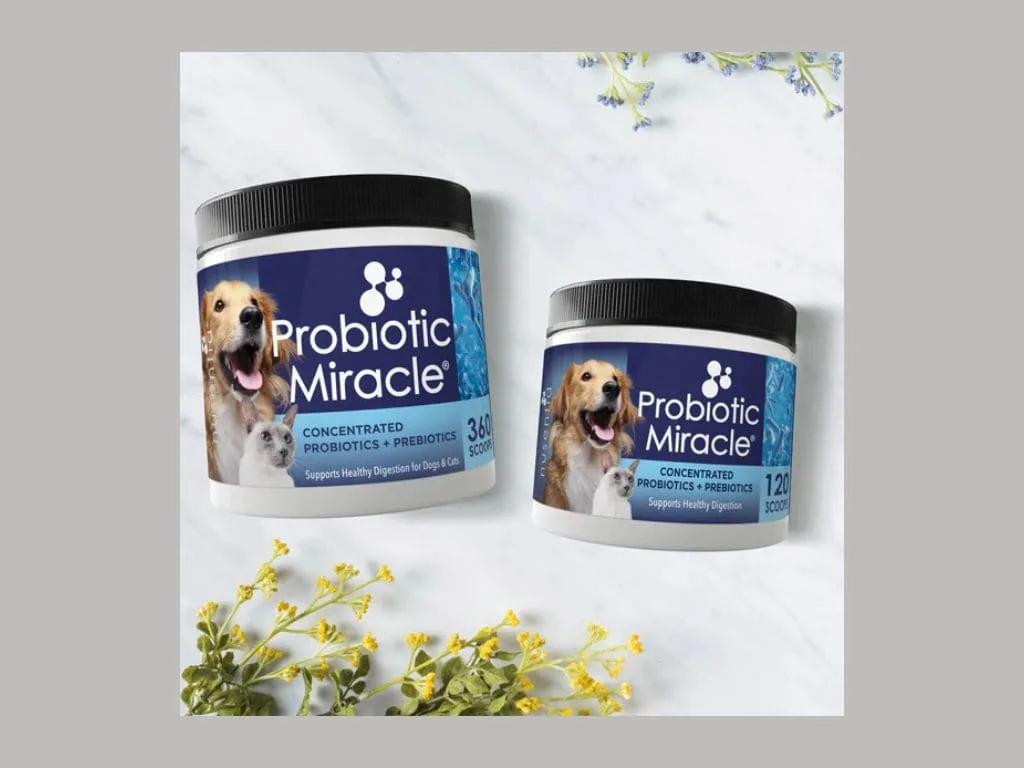
3. Zesty Paws Probiotic Bites
- Soft chews, chicken-flavored (dogs love them)
- Contains pumpkin for extra gut support
- Good for picky eaters
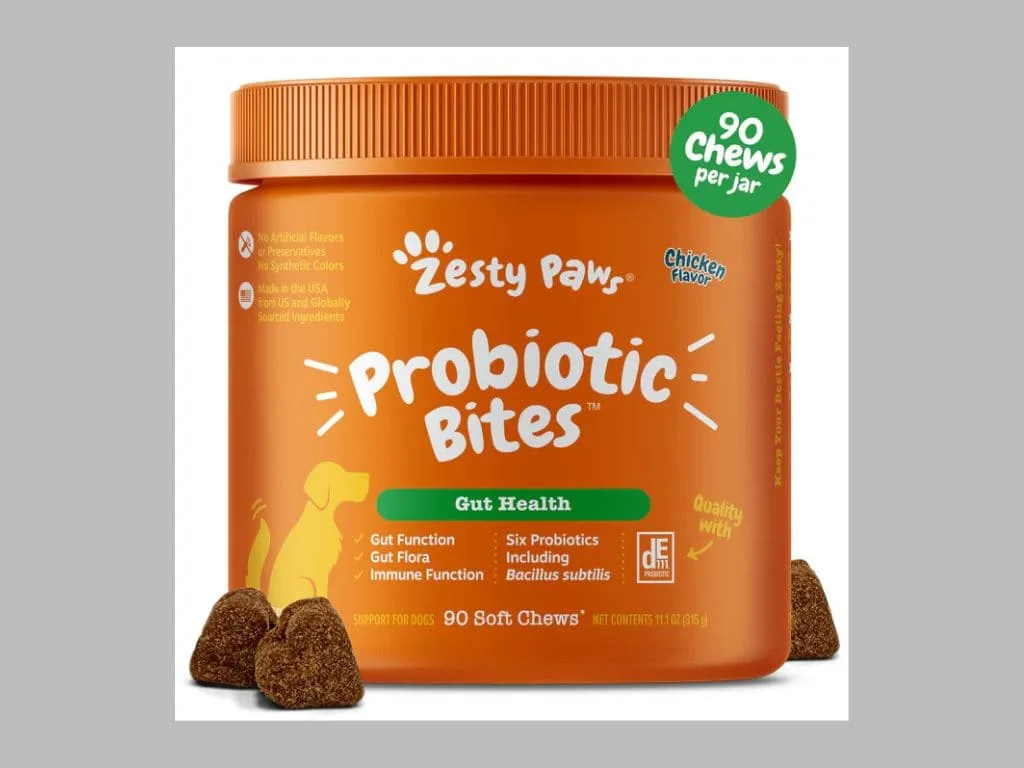
4. VetriScience Probiotic Everyday
- For Digestive Support
- Helpful during stress (boarding, travel)
- Recommended by holistic vets
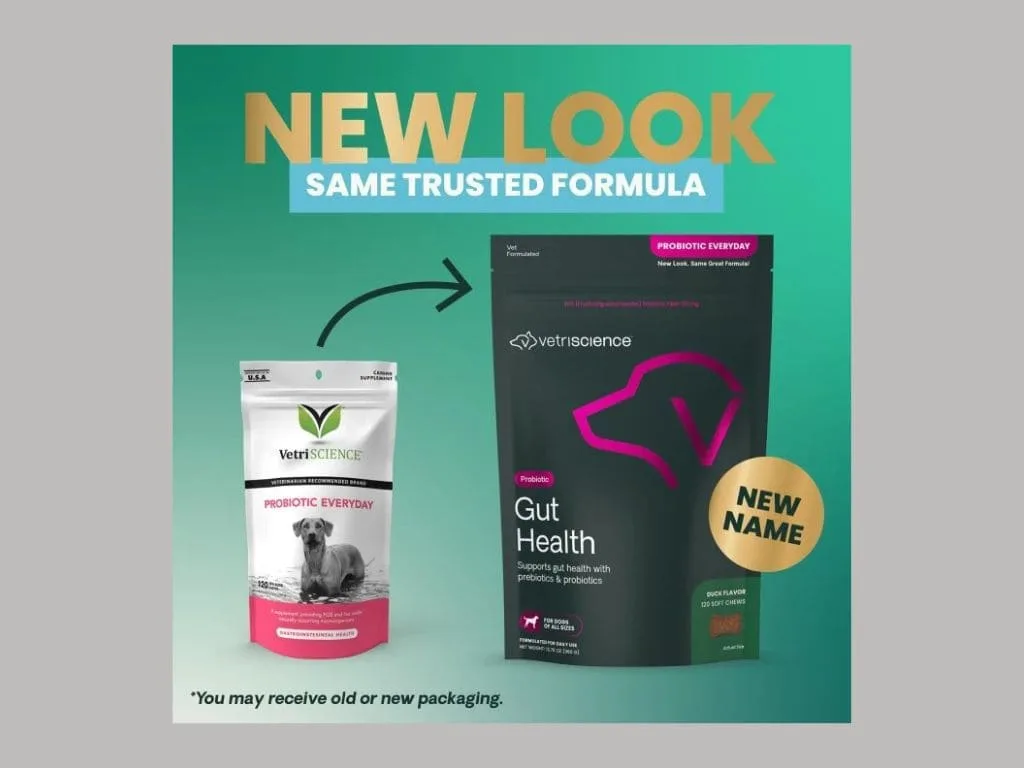
How to Introduce Probiotics to Your Dog
Switching to probiotics should be done gradually:
- Start with a small dose as recommended by your vet.
- Mix powder/chew into your dog’s regular food.
- Observe for changes in stool consistency and energy levels.
- Avoid giving multiple supplements at the same time to prevent stomach upset.
Natural Probiotic Foods for Dogs
Probiotics for dogs with sensitive stomachs are effective, but many everyday foods naturally contain probiotics and prebiotics. These can be introduced safely in small amounts alongside your dog’s regular diet:
- Plain yogurt (unsweetened, xylitol-free)
- Kefir (fermented milk, higher probiotic content)
- Sauerkraut (tiny amounts only, unsalted)
- Goat’s milk (digestible and probiotic-rich)
- Pumpkin puree (fiber + prebiotic)
- Some natural add-ons like pumpkin can also support digestion. Check out my article on Can I Give My Dog Pumpkin for Sensitive Stomach? Vet-Approved Guide (2025)
Always check with your vet before introducing new foods, especially if your dog has a very sensitive stomach.
Read – Homemade Dog Food for Sensitive Stomachs (Complete 2025 Vet-Approved Guide)
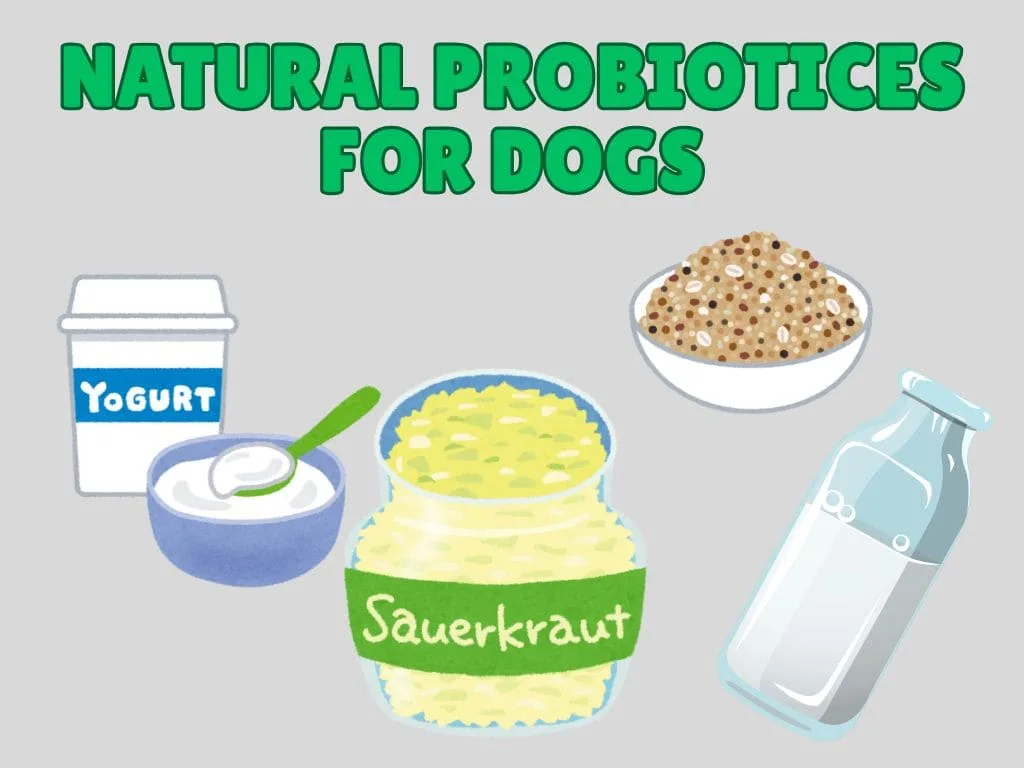
Lifestyle Tips for Better Gut Health
Probiotics are powerful, but overall lifestyle matters too. Support your dog’s digestive health by: – Feeding high-quality dog food free of fillers and artificial additives.
- Maintaining a consistent feeding schedule.
- Ensuring daily exercise for better digestion.
- Providing constant access to fresh water.
- Reducing stress with playtime, routine, and calm environments
When to See a Veterinarian
While probiotics help many dogs, some stomach issues may need professional treatment. Consult your vet if your dog:
- Has persistent vomiting
- Loses weight rapidly
- Shows blood in stool
- Refuses to eat for more than 24 hours
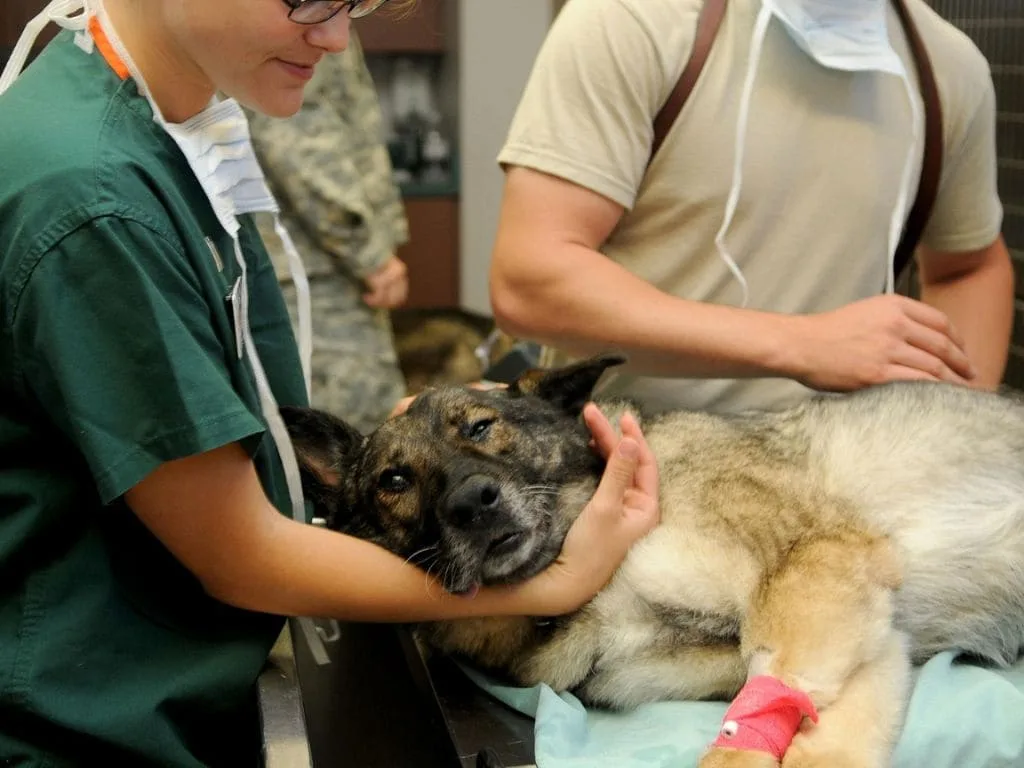
Case Study – From Sickly Stomach to Healthy Pup
Sarah, a dog mom from Boston, recalls:
“My retriever, Daisy, had chronic diarrhea. We tried different foods, but nothing worked long-term. My vet recommended probiotics. Within two weeks of adding Purina FortiFlora, Daisy’s stools firmed up, her energy returned, and even her coat looked shinier. Now probiotics are a non-negotiable in our home.”
Real-life stories highlight just how effective probiotics can be for sensitive dogs
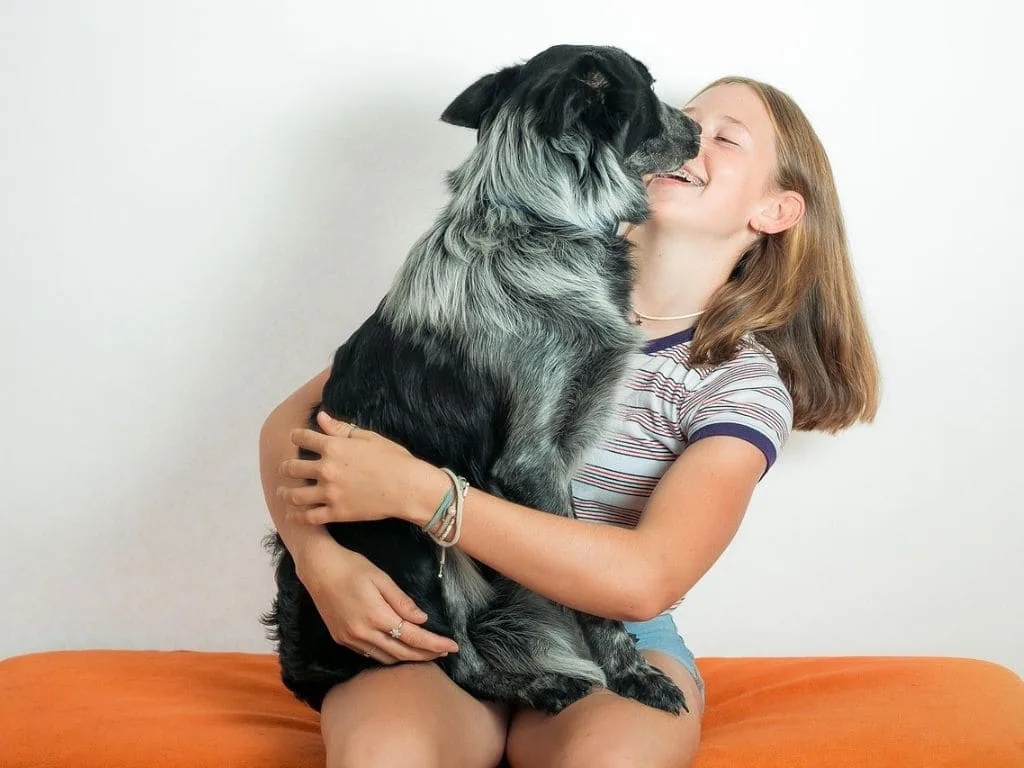
Frequently Asked Questions (FAQ)
Can I give my dog human probiotics?
No, you shouldn’t give your dog human probiotics. A dog’s digestive system is different, and human strains may be ineffective or cause stomach upset. Always choose vet-approved dog probiotics that contain canine-specific strains like Enterococcus faecium or Bifidobacterium animalis for safe and effective gut support.
How long does it take for probiotics to work?
Probiotics for dogs usually start showing results in 7–10 days, improving digestion and stool quality. In some cases, full benefits like reduced gas and better appetite may take 3–4 weeks of consistent use.
Are probiotics safe for puppies?
Yes, probiotics are safe for puppies when you use vet-approved formulas. They support developing digestion, strengthen immunity, and can help reduce diarrhea during weaning or stress.
Should probiotics be given daily?
Daily probiotics are recommended to keep your dog’s gut bacteria balanced. Regular use helps prevent digestive upset, supports nutrient absorption, and boosts long-term gut health.
Are there any side effects?
Probiotics rarely cause side effects in dogs. Some may experience mild bloating or softer stools at first, but these usually go away as their digestive system adjusts.
Do probiotics help with allergies?
Yes, probiotics may help dogs with allergies by improving gut health and reducing inflammation. A stronger gut microbiome also supports the immune system, easing skin and digestive reactions.
Can probiotics be given after antibiotics?
Absolutely. Probiotics restore healthy gut bacteria that antibiotics may deplete. Giving them after a treatment helps faster recovery and prevents stomach upset or diarrhea.
Are probiotics good for senior dogs?
Yes, senior dogs benefit greatly from probiotics. They improve digestion, support nutrient absorption, and help boost immunity, which naturally weakens with age.
What probiotic strains are best?
The best probiotic strains for dogs include Lactobacillus acidophilus, Bifidobacterium animalis, and Enterococcus faecium. These strains are proven to improve digestion and gut balance.
Can I combine probiotics with prebiotics?
Yes, combining probiotics with prebiotics creates a synbiotic effect. Prebiotics feed the good bacteria, helping probiotics work more effectively in your dog’s gut.
Do probiotics boost immunity?
Yes, about 70% of your dog’s immunity lies in the gut. Probiotics strengthen gut health, which directly improves immune defense and overall well-being.
Can probiotics improve skin and coat?
Yes, probiotics can improve your dog’s skin and coat by enhancing nutrient absorption. A healthy gut reduces inflammation, leading to less itching and a shinier coat.
Final Thoughts
Probiotics can make a world of difference for dogs with sensitive stomachs. From improving digestion to boosting immunity, they are a safe and effective option.
Probiotics support gut health, but a balanced diet matters too. Don’t miss our detailed guide on the best dog food for sensitive stomachs (2025 vet-approved guide) to keep your pup happy and healthy.
A happy gut means a happier, healthier dog—and that’s what every pet parent wants!
Hi, I’m Maddy, the writer behind HappyDogGut.com.
I’m passionate about helping Dog parents understand Gut Health, Sensitive Stomachs, and Natural Nutrition for dogs.
Every article I create is vet-approved, research-backed, and experience-driven, so your pup can enjoy a healthier, happier gut.
Happy Gut = Happy Dog!
All content on Happy Dog Gut follows our Editorial Policy.

